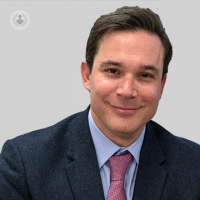Relieving a painful shoulder: a guide to shoulder pain treatment
Written by:Whether shoulder pain is caused by a rotator cuff tear, tendonitis, a pinched nerve, or a frozen shoulder, there are options for treatment once the cause has been diagnosed. Mr Ioannis Polyzois, an orthopaedic surgeon at the top of his game, is here to explain.

When should I see a doctor about my shoulder pain?
Some significant signs that you should be seen by a doctor include:
- Inability to carry objects or use the arm
- Shoulder pain that occurs (or worsens) at night or when resting
- Injury that causes deformity of the joint
- Shoulder pain that persists beyond a few days
- Inability to raise and move the arm
- Swelling or significant bruising of the joint of the arm
- Signs of an infection (fever, skin redness and warmth)
- Any other unusual symptoms associated with the shoulder like abdominal pain, trouble breathing or chest pain.
How can the cause of the pain be diagnosed?
Since there are many potential causes of shoulder pain, a thorough review of the symptoms and thorough clinical examination and imaging tests are imperative to make a diagnosis.
After taking a thorough history, the doctor will perform a detailed examination of the shoulder. They may press on different areas of the shoulder to test for tenderness or deformity. They will test the strength of your arm and the range of motion of the shoulder.
They may also examine other areas of your body, such as the neck or spine.
In addition to the clinical examination, the doctor will order imaging tests to confirm the diagnosis:
- X-rays – these can detect whether there is any injury to the bone as well as showing clues such as bone spurs, calcium deposits, or osteophytes, which can potentially suggest a diagnosis of osteoarthritis.
- Ultrasound – a simple, non-invasive test and reliable, dynamic diagnostic tool to evaluate the shoulder and all the structures.
- CT scan – can evaluate the architecture of the joints and bone in cases of deformity, fractures or injuries.
- MRI – magnetic resonance imaging of the shoulder is the gold standard examination and can provide detailed imaging of the ligaments, tendons and muscles around the shoulder. It can provide information about the location, size, shape, and degree of fatty atrophy of a rotator cuff tear.
Learn about skiing injuries to the shoulder with Mr Polyzois here.
What are the most common treatments used for shoulder pain?
Treatment for shoulder pain depends completely on the cause of the problem. The most important thing is getting to the bottom of the diagnosis before starting on the programme.
- Rest – the first treatment for many common conditions is to rest the joint and allow the inflammation to subside. It is important not to prolong the immobilisation of the joint because this may cause a frozen shoulder.
- Ice packs – these can be used to reduce swelling and pain following injury or overuse. Uses include rotator cuff tendonitis and bursitis (inflammation of the fluid-filled sacs that lubricate the tendons (bursa)).
- Heat pad – these are used to treat chronic shoulder conditions, generally applied before activity. Heat can relax the muscle, easing stiffness and reducing pain.
- Physiotherapy – physiotherapy is of the utmost importance in almost all orthopaedic conditions, including shoulder conditions. Experienced physiotherapists use different treatment strategies to improve strength, restoring mobility and helping people to return to pre-injury levels of activity. Treatments include deep massage, acupuncture, and specific exercises to stretch, rehabilitate, and strengthen the specific muscle groups.
Drugs and medications – the most common drugs are non-steroidal anti-inflammatory drugs and steroid injections.
- Non-steroidal anti-inflammatory drugs (NSAIDS) – these are available over the counter, e.g. ibuprofen and others such as Diclofenac and Naproxen. They are used to treat shoulder problems such as arthritis, bursitis and tendonitis. It is important to only use them for a short duration as they can be associated with risks as well; specifically people suffering from hypertension, asthma, history of kidney problems, liver disease or stomach ulcers should not be prescribed NSAIDs.
- Steroid injection – with a steroid injection, the doctor will give you a combination of steroid with local anaesthetic. It can be image-guided (such as ultrasound-guided) in the area of the shoulder where you are experiencing the pain. The idea behind the steroid injection is not only to alleviate the pain but to help you to engage in physiotherapy more easily and restore the shoulder back to its normal function and strength.
Surgery
In some cases, surgery will need to be performed if non-operative or conservative measures have failed due to the shoulder injury being too severe from the start.
I perform arthroscopic shoulder surgery with mini-incisions, with good, fast, reliable rehabilitation. Apart from trauma fractures, chronic injuries, instability with significant bone loss, or osteoarthritis, all other conditions around the shoulder can be dealt with via minimally invasive keyhole arthroscopic surgery.
Visit Mr Polyzois's Top Doctors profile to learn more or book an appointment!



